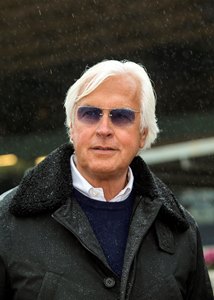The Jockey Club Offers Input in Baffert v. NYRA Case


An attorney for The Jockey Club asked a United States District Court June 22 for permission to provide added information in a civil case brought by Bob Baffert against the New York Racing Association, which recently banned the Racing Hall of Fame trainer from its tracks.
Susan Phillips Read, an attorney for The Jockey Club, filed a request for permission to provide an amicus brief with Judge Carol Bagley Amon in U.S. District Court for the Eastern District of New York. If that permission is granted, Read said The Jockey Club would file an amicus brief on behalf of NYRA and in opposition to Baffert's efforts to be granted a temporary injunction to lift its ban.
"In sum, The Jockey Club possesses a unique perspective on issues involved in this litigation and is in a position to supply information that should be helpful to the court and its decision-making," Read wrote. "Accordingly, The Jockey Club requests permission to file an amicus brief in Baffert v. NYRA on or before July 7, 2021."
Baffert-trained Medina Spirit failed a post-race drug test after finishing first in the Kentucky Derby Presented by Woodford Reserve (G1) May 1 at Churchill Downs. Churchill Downs Inc. initially summarily suspended Baffert from its tracks before announcing a two-year ban after a split sample confirmed the initial test finding. NYRA announced May 17 that Baffert would temporarily be suspended pending further information in the Kentucky case, meaning the trainer could not enter horses or be assigned stalls at Belmont Park, Saratoga Race Course, or Aqueduct Racetrack.
Medina Spirit tested positive for the corticosteroid betamethasone in the post-race test after the Derby. It marked the fifth failed drug test since May 2, 2020, for a horse trained by Baffert. While those failed drug tests all involved medications that are allowed to be used in racing, strict guidelines are in place for these substances as the industry works to curtail catastrophic breakdowns.
In making the case to allow The Jockey Club to file as a friend of the court, Read noted The Jockey Club's support of the Horseracing Integrity and Safety Act and its commitment to medication-free racing. The filing added that The Jockey Club, through its wholly-owned subsidiaries and Thoroughbred Safety Committee, has access to information not necessarily available to the parties.
"As a result, we believe that we are in a unique position to assemble material to assist the court with issues of irreparable injury, balance of hardships, and the public interest," Read wrote. "The Jockey Club does not intend to duplicate the party's legal arguments."
The request by The Jockey Club has the favor of NYRA but is opposed by Baffert and his counsel. Read noted that courts have broad discretion in deciding whether or not to accept amicus briefs and noted that they are of special importance when the interest of the general public is at stake.
Churchill and NYRA are taking action in the Baffert case beyond any regulatory decision.
Stewards in Kentucky have not yet held a hearing in the Medina Spirit case as the two sides there have argued over further testing. Any suspension placed on Baffert through the Kentucky stewards and the Kentucky Horse Racing Commission would be a regulatory action and would be honored at all tracks, pending an appeals process.
